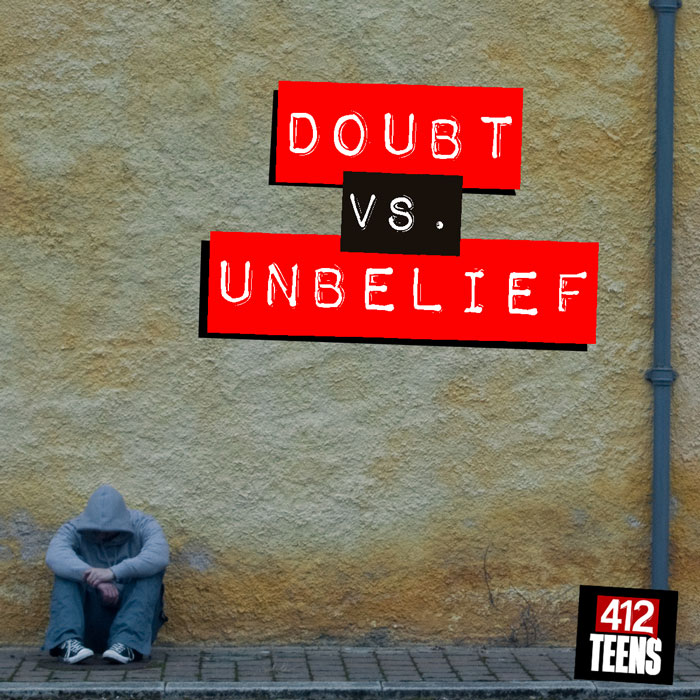What's the difference between doubt and unbelief?

Doubt and unbelief may seem similar, but they're actually very different when it comes to faith. As a Christian, you may struggle with questions about God, the Bible, or your spiritual journey. That's completely normal!
But does having doubts mean you're walking away from God or that your faith isn't strong enough? Not necessarily. Every Christian goes through periods of confusion and doubt. Working through doubts, questioning what you read in the Bible, and seeking true answers is part of the process of discovering the truth. Unbelief is a pure, obstinate decision to not believe—despite the evidence before you.
Understanding the difference between doubt and unbelief can help you grow in your faith rather than feel ashamed of the struggle.
What is doubt?
Doubt is when you have questions or uncertainties about what you believe. As we develop our faith throughout our lives, it's normal to go through waves of faith and uncertainty.
The Bible tells us about strong believers who experienced doubt. Think about John the Baptist—he was the one who baptized Jesus and declared Him as the Lamb of God, yet later, when he was in prison, he sent messengers to ask Jesus, "Are you the one who is to come, or should we expect someone else?" (Luke 7:19). John wasn't rejecting Jesus. Rather, he was seeking reassurance.
Doubt is often fueled by emotions, frustrations, and confusion. Doubt is often triggered by difficult life circumstances, unanswered prayers, or feeling distant from God. It doesn't mean you lack faith, but that your faith is being challenged. Instead of running from God when you feel doubts, allow those doubts to lead you back to Him as you seek the truth more earnestly.
What is unbelief?
Unbelief is an outright refusal to trust God. Unlike doubt, which seeks answers, unbelief is a decision to reject God's truth. In the Old Testament, the plight of the Israelites is a good example. Even after seeing God perform miracles—parting the Red Sea (Exodus 14:21-22), providing manna to eat in the wilderness (Exodus 16:15)—they still chose not to trust Him (Numbers 13-14).
"Take care, brothers, lest there be in any of you an evil, unbelieving heart, leading you to fall away from the living God." —Hebrews 3:12
Satan wants us to believe that just because we have these questions that means that we don't believe at all. He tells us that we must not even be real Christians in the first place. But when we buy into Satan's lies, we get into a hurricane of confusion, and the truth is hard to see.
While doubt wrestles with questions, unbelief refuses to believe the truth even when the answers are clear. It's not about struggling to understand; it's about choosing not to trust God at all.
Does doubt mean I have weak faith?
No! Doubt can actually be a part of growing in your faith. When you ask hard questions and truly seek answers, your faith strengthens. James 1:5 encourages us to ask God for wisdom when we lack understanding, and He promises to give it generously. God isn't afraid of your questions. He invites you to bring them to Him.
Thomas, one of Jesus' disciples, doubted Jesus' resurrection and said he wouldn't believe unless he saw and touched Jesus' wounds (John 20:25). And when Jesus appeared to him, Thomas believed. Jesus didn't condemn him. He met Thomas in his doubt and provided the proof he needed.
"There is therefore now no condemnation for those who are in Christ Jesus." —Romans 8:1
How can I overcome doubt?
- Take your doubts to God. Instead of feeling guilty or ashamed, talk to God about your doubts. Be honest about your struggles, just like David did in the Psalms. He can handle it!
- Seek answers. Read Scripture, talk to a trusted pastor or mentor, and study reliable Christian resources. Faith isn't blind—it's based on truth.
- Find community with other believers. Doubt often grows in isolation. Being part of a strong Christian community can help encourage and strengthen your faith (Proverbs 27:17). (Psst...412teens has a Discord!)
- Remember what God has done. Look back on times when God has been faithful to you. You could keep a journal or note on your phone to record answered prayers or moments of spiritual growth that can help remind you of His goodness in your life.
Avoiding Unbelief
If doubt is left unresolved, it can lead to unbelief. When someone constantly rejects God's truth and refuses to trust Him, their heart can become hardened (Hebrews 3:13). The best way to avoid (or repair) a hardened heart is to actively seek God—especially when you have questions. Trusting in God doesn't mean you'll never have any doubts ever, but it does mean you choose to hold onto and turn to Him—even in the midst of confusion.
Doubt is not the enemy of faith—unbelief is. If you have questions, don't be afraid to ask them. God welcomes your search for truth. Doubt can be a stepping stone to a deeper relationship with Him if you're willing to seek answers. Instead of running from God in your uncertainty, run toward Him. He is faithful, patient, and ready to walk with you in your spiritual journey.
"Trust in the Lord with all your heart, and do not lean on your own understanding." —Proverbs 3:5
ALSO SEE:
- Do I really believe?
- Is it OK to question God?
- Is it wrong to question the Bible?
- Does the Bible contain errors?
- Do faith in God and science contradict?
- If I doubt my salvation, does that mean I'm not saved?
- What does the Bible say about doubt?
- What does the Bible say about insecurity?
- What does the Bible say about overthinking?
- How can I increase my faith?
- Faith vs. Fear: What does the Bible say?
- What should I do if I'm losing the faith I grew up with?
- Have a repented enough to be saved?
- What is a lukewarm faith?
- What are some signs of a genuine saving faith?
- What is the helmet of salvation?


TL;DR
Doubt is when you have questions or uncertainties about what you believe. As we develop our faith throughout our lives, it's normal to go through waves of faith and uncertainty. Unbelief is an outright refusal to trust God. Unlike doubt, which seeks answers, unbelief is a decision to reject God's truth. Doubt can actually be a part of growing in your faith. When you ask hard questions and truly seek answers, your faith strengthens. Doubt is not the enemy of faith—unbelief is. If you have questions, don't be afraid to ask them. God welcomes your search for truth.

Writer: Cameron
Cameron loves God, his family, and music. He lives in Kentucky and enjoys Show Choir, band, and playing the piano.

Writer & Managing Editor: Catiana (Cat)
Cat is the web producer and managing editor of 412teens.org. She is known as "412teens" on the 412teens Discord. She loves audiobooks, feeding the people she cares about, and using Christmas lights to illuminate a room. When Cat is not cooking, gardening, or practicing creativity, she enjoys spending time with her two adult kids, six socially-awkward cats, and her amazing friend-amily.
